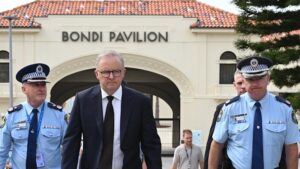
Australian content creator Chloe Baradinsky is under renewed scrutiny regarding her trip to Afghanistan, particularly following claims that her travel expenses were subsidized by the Taliban. The discussion gained traction after a segment from ABC’s Media Watch raised ethical concerns about Western influencers visiting the country, highlighting that Baradinsky received a discount of approximately $600 from her tour company.
The conversations around Baradinsky intensified as podcasts like Big Small Talk and Just The Gist speculated on whether her trip was sponsored. Critics on platforms like TikTok accused her of promoting Afghanistan as a travel destination, despite ongoing restrictions on women’s rights under Taliban rule.
Media Watch Raises Ethical Questions
The episode began when Media Watch questioned the implications of influencers traveling to Afghanistan. They linked Baradinsky’s social media posts from locations such as Kabul and Band-e-Amir National Park to a broader trend of what they termed “Taliban tourism.” The segment suggested that showcasing Afghanistan’s scenic beauty could unintentionally obscure the harsh realities faced by many under Taliban control, especially women.
It was revealed that Baradinsky’s travel company had waived about 20% of her package costs, a detail some argue should have been disclosed to her audience.
In response to the backlash, Baradinsky released a video on TikTok, where she addressed the ongoing coverage. She expressed frustration with the media’s framing of her situation, stating, “I feel like it’s beating a dead horse and I’m so over it.” She clarified that while several tour companies offered discounts upon discovering her online presence, she paid for the trip using her own savings. “I never once said, ‘Hey, I’m an influencer, can I get a discount?’” she asserted.
Baradinsky emphasized her financial independence, explaining, “I used to be a corporate slave — I’ve got savings to spend on these trips.” She also mentioned that she provided generous cash tips to her tour guide and driver, indicating that her overall spending exceeded the full price of her trip.
Concerns Over Influencer Travel
The broader implications of influencer travel in Afghanistan raise significant concerns. Roya Musawi, an Afghan journalist and activist, articulated that such content can inadvertently serve as public relations for the Taliban. She stated, “The foreign tourists and influencers who are travelling to Afghanistan…advertise and whitewash their radical regime which banned basic human rights like access to education to women and girls.”
Musawi pointed out that tourists often showcase only the picturesque aspects of Afghanistan while ignoring the severe human rights violations occurring under Taliban rule. She highlighted, “The Afghan women are not happy with what tourists are showing to the world.”
Musawi further stressed the need for Western audiences to understand the hidden realities under the Taliban regime. “The content coming from influencer creators is misleading and puts the audiences in a crossway about who to trust,” she added.
In light of the controversy, Australia’s consumer watchdog, the ACCC, has reminded influencers about the legal obligations under the Australian Consumer Law. An ACCC spokesperson stated, “Under the ACL, businesses, including influencers, should not engage in misleading or deceptive conduct.” The spokesperson emphasized that failing to disclose commercial relationships could mislead consumers.
Baradinsky has indicated that she plans to share a detailed breakdown of her trip costs once public interest subsides. While there is no indication that she is under investigation by the ACCC, the ongoing debate over the ethics of influencer travel continues to evolve.
As the conversation unfolds, opinions remain divided. Some defend Baradinsky’s right to travel and share her experiences, while others question the ethical implications of promoting tourism in regions with oppressive regimes. The complexities of influencer responsibility in such sensitive contexts remain a focal point for discussion.






